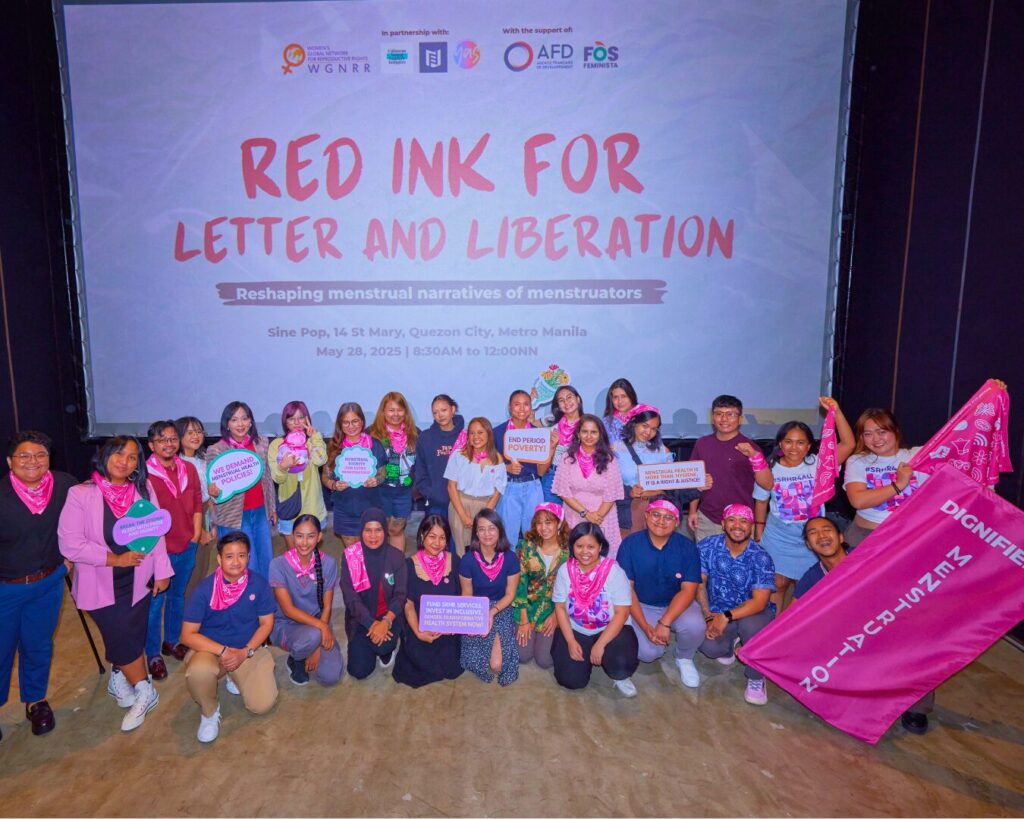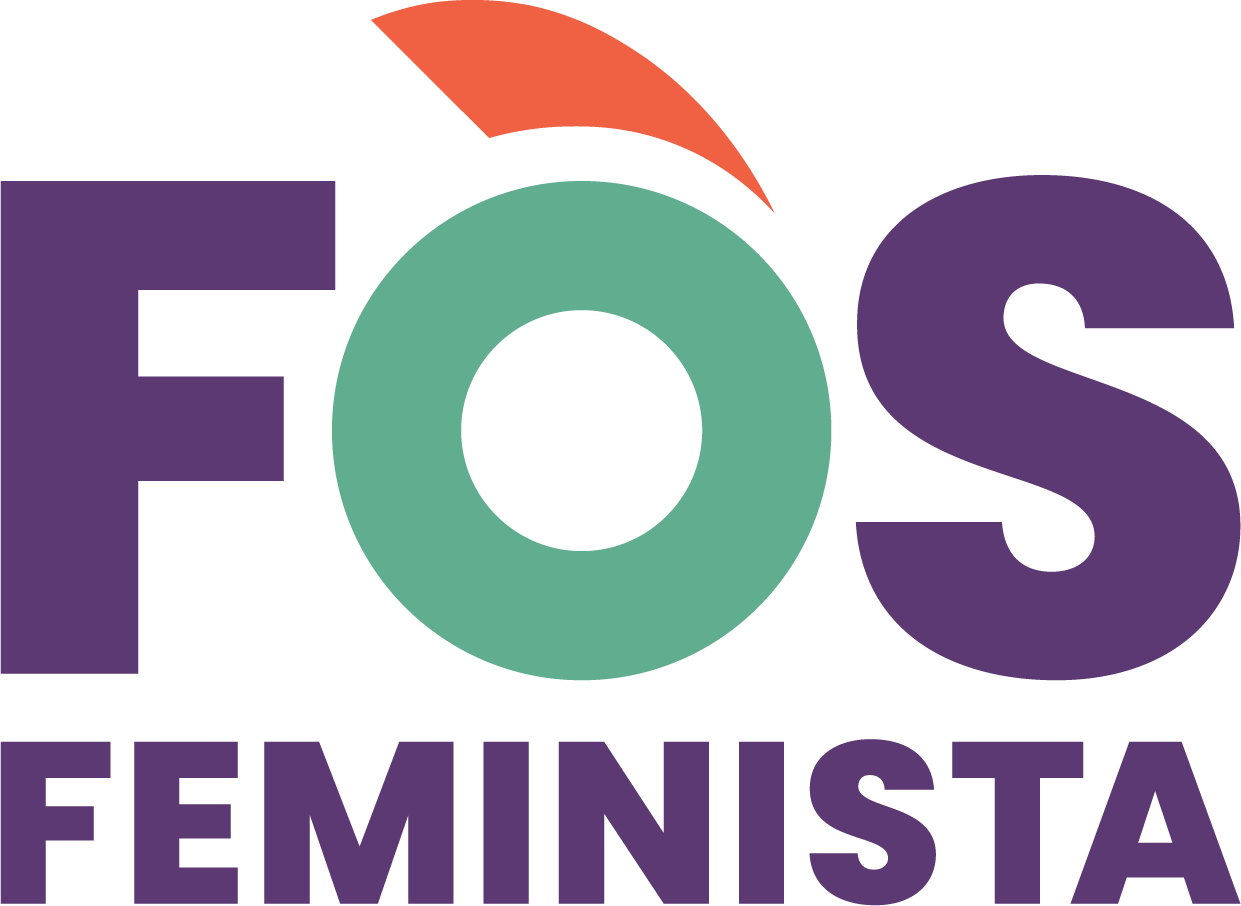Each year on May 28, the global community comes together to reaffirm the importance of menstrual health and dignity. This blog post offers a snapshot of how partners across the Sang Pour Sang network commemorated Menstrual Health Day 2025 — through powerful actions rooted in community, creativity, and advocacy.
By the Sang Pour Sang team
From Nigeria to Pakistan and the Philippines, our partners organized vibrant events that engaged students, artists, activists, policymakers, and community members. These actions broke stigma, elevated underrepresented voices, and fostered collective conversations on menstrual justice.
While this compilation includes those partners who were able to share their activities and documentation, we recognize that many more across the network also commemorated May 28 through meaningful and powerful actions.
ASVIOL Support Initiative – Nigeria
On May 28, 2025, The Anti Sexual Violence Lead Support Initiative (ASVIOL Support Initiative), hosted an event titled “Breaking the Silence: A Menstrual Tea Party For Workplace Inclusion And Dignity” in celebration of Menstrual Hygiene Day 2025. The event was held at Work and Connect in Abuja, The Federal Capital Territory, Nigeria. This event, supported by Fòs Feminista and with funding from the Agency for French Development (AFD), aimed to normalize conversations around menstruation and promote supportive environments, particularly in workplaces.
Dignitaries and representatives from various organizations, including the French Embassy, Education as a Vaccine (SPS), Centrum Finance, and Girls Voices Initiative, delivered speeches emphasizing the importance of accessible sanitary products, non-discriminatory support for menstruating individuals, and leveraging social media for advocacy.
This project is a crucial step in ASVIOL Support Initiative’s commitment to using all available resources, both physical events and social media platforms, to reach every girl child and ensure menstrual dignity across Nigeria and beyond.
Big Family 360 Foundation – Nigeria
On May 28, 2025, Big Family 360 Foundation, in collaboration with key partners, hosted a powerful engagement at the Women Development Center in Yola, Adamawa State, to commemorate World Menstrual Hygiene Day. Under the global theme “Together for a Period-Friendly World,” the event convened students, youth advocates, policymakers, people with disabilities, and community leaders from across Adamawa. Participants engaged in critical conversations around menstrual health policy implementation, shared findings from the Sang Pour Sang Project, and amplified youth voices on hygiene, dignity, and equity.
Highlights included a keynote address by Rt. Hon. Mrs. Kate Raymond Mamuno, Chairperson of the Adamawa State House Committee on Women Affairs, as well as expert-led panel sessions, and a public pledge towards creating a menstrual-friendly Adamawa.
The event marked a strong step forward in the fight to end period poverty and ensure no menstruator is left behind.
In the five days leading up to World Menstrual Hygiene Day, we successfully implemented a themed social media campaign across Facebook, LinkedIn, and Instagram. The campaign was designed to raise awareness and foster open conversations around menstruation by breaking myths, promoting period dignity, and highlighting menstruation as a natural and healthy part of life. Through a mix of engaging graphics, quotes, polls, and educational posts, we aimed to challenge stigma, empower menstruators, and advocate for access to menstrual health products, education, and safe spaces. Our messaging emphasized that menstrual health is a human right and encouraged communities, especially men and boys, to become allies in this movement.
Although overall engagement on the posts (likes, shares, and comments) was modest, the campaign achieved impressive reach and visibility. It succeeded in sparking conversations and drawing attention to menstrual health and hygiene, thanks to the consistent daily content and strong visual messaging.
Debbie Kauna Foundation – Nigeria
On May 28, 2025, Debbie Kauna Foundation, in collaboration with the United Nations Population Fund (UNFPA), the Adamawa State Ministry of Women Affairs Commission, and the Gender-Based Violence (GBV) Sector Working Group, conducted a menstrual health sensitization program in two schools across Yola North and Yola South Local Government Areas (LGAs) in Adamawa State, Nigeria. In celebration of the World Menstrual Hygiene Day, this initiative targeted the Lutheran Church of Christ in Nigeria (LCCN) Disability Deaf Center Secondary School in Yola North and Government Day Secondary School (GDSS) in Yola South, reaching a total of 140 students, (including those with disabilities) teachers, parents and caregivers.
The session focused on menstrual health hygiene, teaching students how to track their menstrual cycles, appropriate disposal of pads, educate the student on menstrual hygiene, safe space, how to embrace and manage their period without fear and shame, enlightenment on menstrual rights, and pain management during menstruation.
The program was inclusively interactive with facilitators teaching the students the use of pads (reusable pads), the risk factors of using pads instead of rags, how to calculate their menstrual cycle etc. by using sign language interpretation, visual materials, practical methods to ensure accessibility for hearing and visually impaired students. Many had limited prior knowledge on menstrual hygiene education due to lack of menstrual health education. The provision of dignity kits alleviated financial burdens, as sanitary products are often unaffordable. Dignity kits were distributed to all participants, with full support from UNFPA.
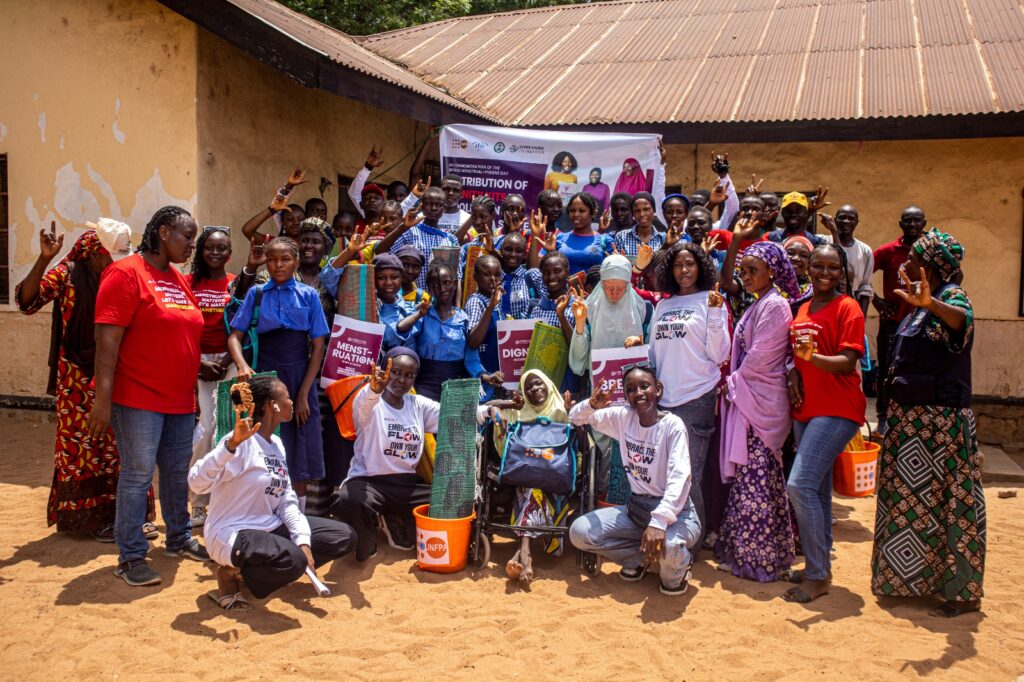
Every Girl Initiative (EGI) – Nigeria
To commemorate May 28, Every Girl Initiative (EGI) organized an Intergenerational Dialogue to Raise awareness and Address Negative Social Norms: The activity brought together young girls, parents, caregivers and related stakeholders in a safe interactive platform, where they are engaged in a learning and interactive session on how old-standing tradition, norms and practices around menstruation endangers the safety, dignity and menstrual rights of present-day menstruating women and girls. The activity provided opportunity and platform for young girls to highlight and elicit the needed support required by present-day teen girls for a safe and dignified menstrual experiences.
In addition, EGI Launched a Pad Bank for community girls of Bobboi and Luggere in Yola North LGA. These communities are both our project and host communities where our office is located and we operate from. The pad bank which is domiciled within our office premises was launched and commissioned by the Deputy Chairperson of Yola North LGA. It consist of both reusable and disposable pad for targeted vulnerable girls, providing access to menstrual products and education on a monthly basis for not less than 50 persons. The products will be provided and sourced from the organization social enterprise arm which produces reusable and ecofriendly menstrual pads.
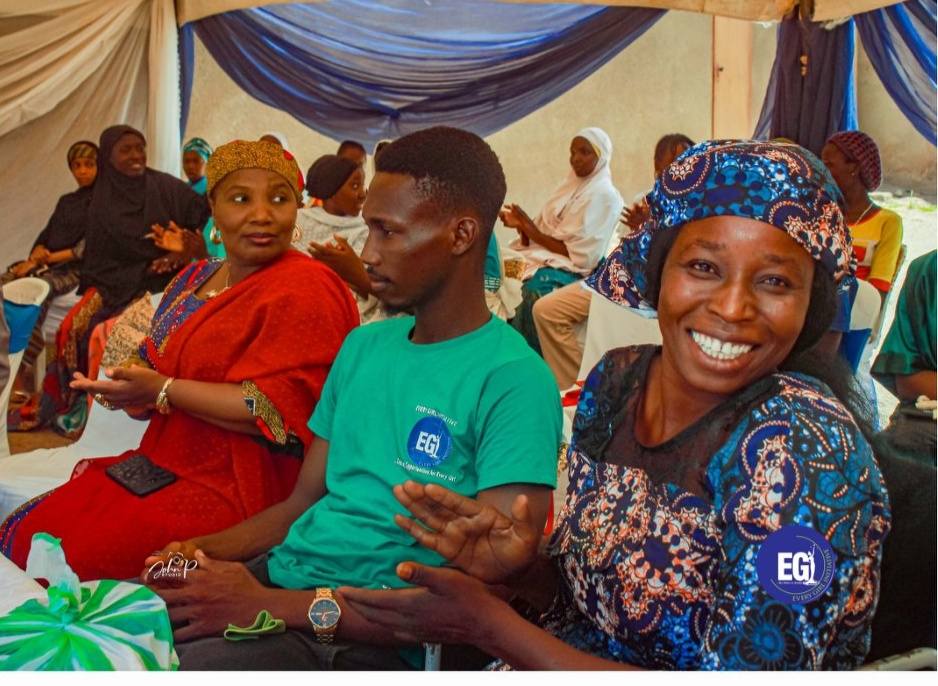
First Step Action for Children Initiative (FSACI) – Nigeria
In commemoration of Menstrual Hygiene Day 2025, FSACI conducted two main activities; a town hall meeting and a mega rally with 3 partners of Fòs Feminista.
As a result, they have been able to mobilize support for positive change in their advocacy approach. As a result, they selected one of the traditional leaders and is now a member of the technical team on policy review.
There was an open conversation on menstrual taboos in their various domains. They had an increased understanding of the effect on women and girls and came out with a plan to sustain the sensitization in their various communities.
Mega Rally:
First Step Partnered with 3 Sang pour Sang implementing organizations for a mega rally to raise awareness, create visibility on menstrual health challenges and advocate for the removal of social and cultural barriers.
Messages were used to create more awareness to the general public about the challenges girls and women face during menstruation and the need to support them.
A complementary media campaign in collaboration with Voice Newspaper, Radio Benue and Benue Television in amplifying these critical messages which helps to normalize conversations around menstruation and calling on stakeholders to act.
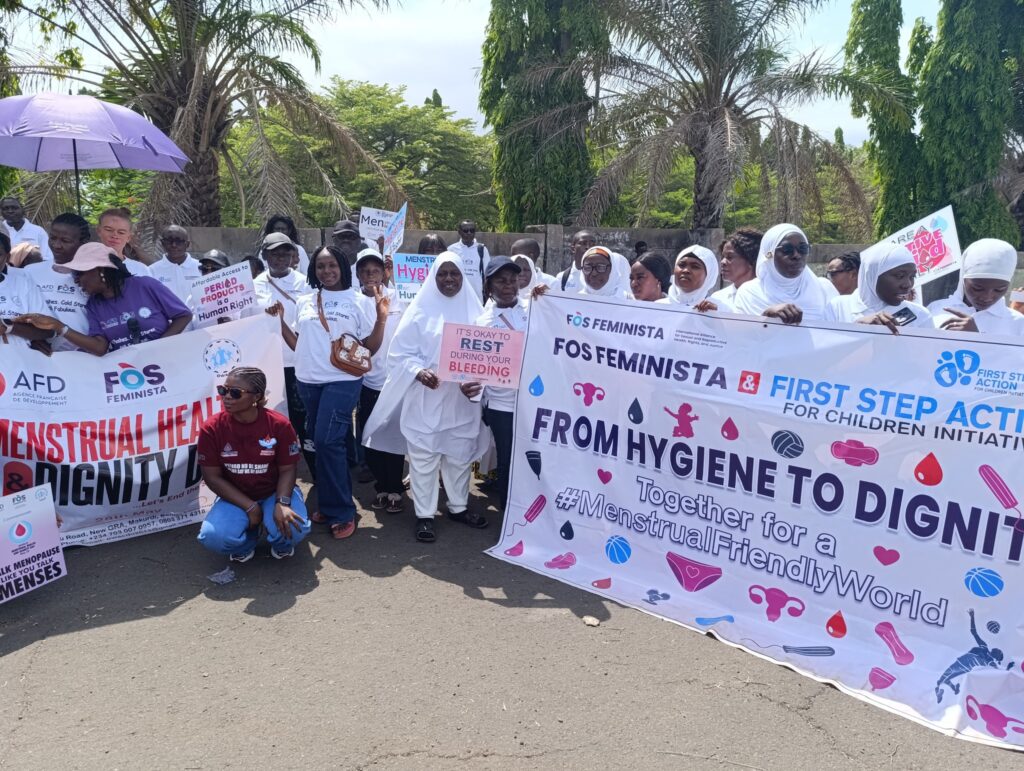
Girls Voices Initiative – Nigeria
As part of the RedDot Campaign Activities and their continuous efforts to promote menstrual dignity and education, Girls Voices Initiative hosted 2 activities as a build up to the RedDot Digital Storytelling Workshop. They hosted a school-based RedDot Expressions and the RedDot community dialogue in Mpape. Both activities focused on promoting menstrual dignity and empowering adolescent girls. The RedDot Expressions provided secondary school adolescent girls a creative outlet for expression about their experiences and perspectives on menstruation through essays, poetry and drawings. The RedDot community dialogue in Mpape complemented that by offering interactive sessions with adolescent girls on menstrual health, human rights and advocacy, challenging stigma, sparking open dialogue and a wall for personal affirmations. Together, these activities marked the celebration of the 2025 Menstrual Health Day and created an avenue to equip girls with knowledge, confidence, and tools to become advocates and push for improved menstrual health in their schools and communities.
Global Women’s Health, Rights, and Empowerment Initiative (GWHREI) – Nigeria
In commemoration of Menstrual Hygiene Day, the Global Women’s Health, Rights, and Empowerment Initiative (GWHREI), with support from Fòs Feminista, carried out a series of impactful activities aimed at raising awareness on menstrual health and hygiene. These efforts were part of a broader campaign to promote dignity, inclusivity, and stigma-free menstruation for all.
- Social Media Promotions
In the lead-up to Menstrual Hygiene Day, GWHREI shared a series of promotional messages across its social media platforms. These messages highlighted key facts about menstrual health, challenged myths and taboos, and encouraged community dialogue around period dignity, particularly for marginalized groups including queer individuals and sex workers.
- Community Rally
On May 28, 2025, a joint rally was held in the Makurdi Local Government Area. The rally began at the Savannah Roundabout and concluded at the IBB Square. The event brought together a diverse group of participants, including queer individuals, sex workers, persons with disabilities, faith-based organizations, representatives from the Ministry of Women Affairs, and community members.
Carrying banners and placards with powerful messages, participants walked in solidarity to break the stigma surrounding menstruation and promote hygienic menstrual practices. Informative materials were distributed throughout the march, and several speeches were delivered by Executive Directors and participants. These speeches emphasized the urgent need for education, community engagement, and policy action to create a world where menstruation is respected, dignified, and supported for everyone, regardless of identity or background.

Hope Alive for Possibilities Initiative (HAPI) – Nigeria
In celebration of Menstrual Hygiene Day 2025, HAPI hosted two impactful events in Makurdi, Benue State. They organized a practical demo session with 40 women and girls with disabilities, caregivers, and sign language interpreters. focused on proper menstrual product usage, best hygiene practices, and eco-friendly disposal. Followed by introduction of the DIVA App to improve menstrual health literacy, especially among girls with intellectual and communication disabilities.
To mark the global Menstrual Hygiene Day, theyjoined a mega rally in partnership with other Sang pour Sang partners in Benue state. We walked through the city center, raised visibility around Menstrual Dignity, disability inclusion, and the call for policy change.
Quotes from Participants.
- “For the first time, I saw a pad opened and explained to me in a way I understand. I feel seen.” – Nadoo, 19-year-old, Blind participant.
- “If condoms can be subsidized in Nigeria, then sanitary pads too can.” – Deaf participant, Makurdi.
- “Disability is not a reason to forget menstrual needs”. – Tovia, 25-year-old, participant with albinism.
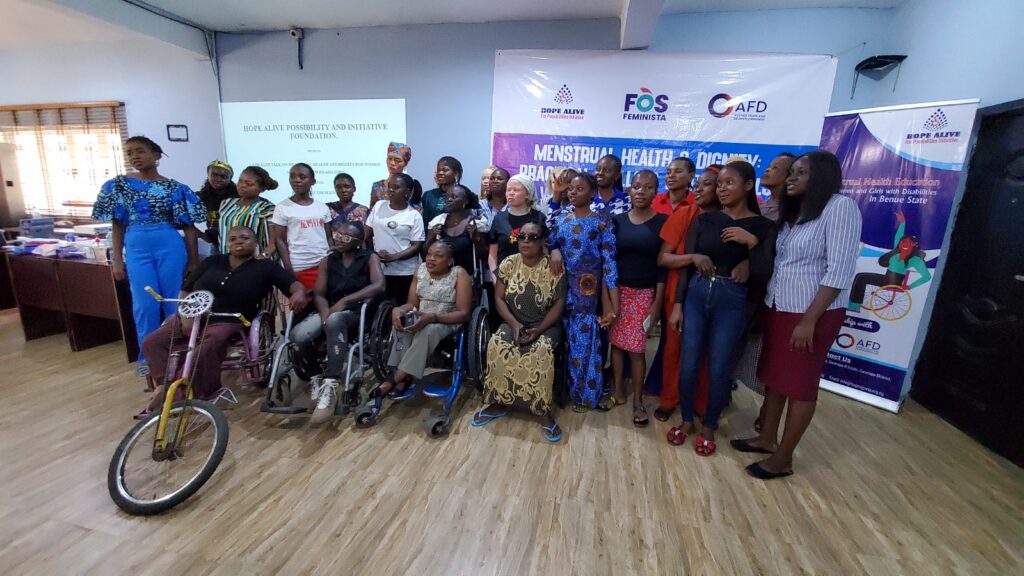
Intersex Nigeria – Nigeria
On May 28, 2025, Intersex Nigeria hosted an Instagram Live session as part of our Inclusive Cycle project to commemorate Menstrual Hygiene Day. The session, held virtually and streamed live on Instagram, focused on centering intersex voices in conversations about menstrual health and bodily autonomy. The title is “Menstrual Health and Intersex Realities” and they were joined by Frankie Kibagendi, the Executive Director of Intersex Kenya Education and Advocacy and the creator of Inclusive menstrual health product, Inclusifit. They also engaged with community members through curated content and interactive discussions leading up to the event.
- “This is the first time I’ve heard someone talk about how intersex people experience menstruation. It made me feel seen.” — Instagram Live participant
Watch the Instagram Live here.
Organisation for Women and Children Development Outreach (OWACDO) – Nigeria
On May 28th, they led a powerful Menstrual Hygiene Day Rally through the heart of Makurdi, Benue State, to spotlight the menstrual and menopausal challenges women over 35 face every day. The rally, which began at Savannah Roundabout and ended at IBB Square, drew over 100 participants and covered nearly 2 kilometers of vibrant, purposeful movement.
The energy was infectious. As music pumped through speakers and banners flew high, OWACDO volunteers distributed flyers and engaged with curious onlookers. The mobile public address system allowed them to speak directly to small crowds at multiple stops, breaking the silence around topics often considered taboo.
This year’s focus was clear: ending menstrual discrimination against women aged 35 and above. Many still menstruate, some enter perimenopause, and others transition into menopause—yet conversations often exclude them.
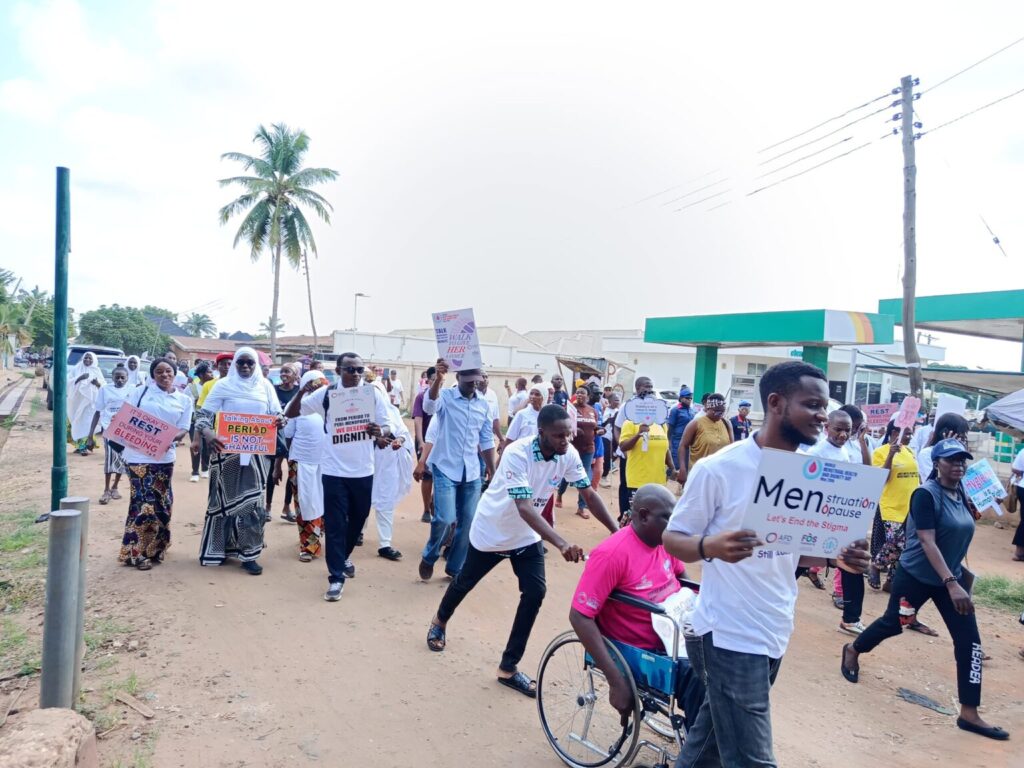
SWAG Initiative – Nigeria
As part of the Dignity in Menstruation (DIM) Project, and with support from Fòs Feminista, SWAG Initiative celebrated Menstrual Hygiene Day 2025 by engaging 912 students (both girls and boys) at Junior Secondary School, Hajj Camp, in Gwagwalada. The session focused on breaking menstrual stigma, educating students on menstrual hygiene, and promoting dignity for all who menstruate. By involving boys and men in schools and communities, SWAG is helping transform harmful social norms and beliefs that affect girls’ and women’s rights and wellbeing.
“Periods are a normal part of life. So, why do we still whisper about them? It’s time to change the conversation.”
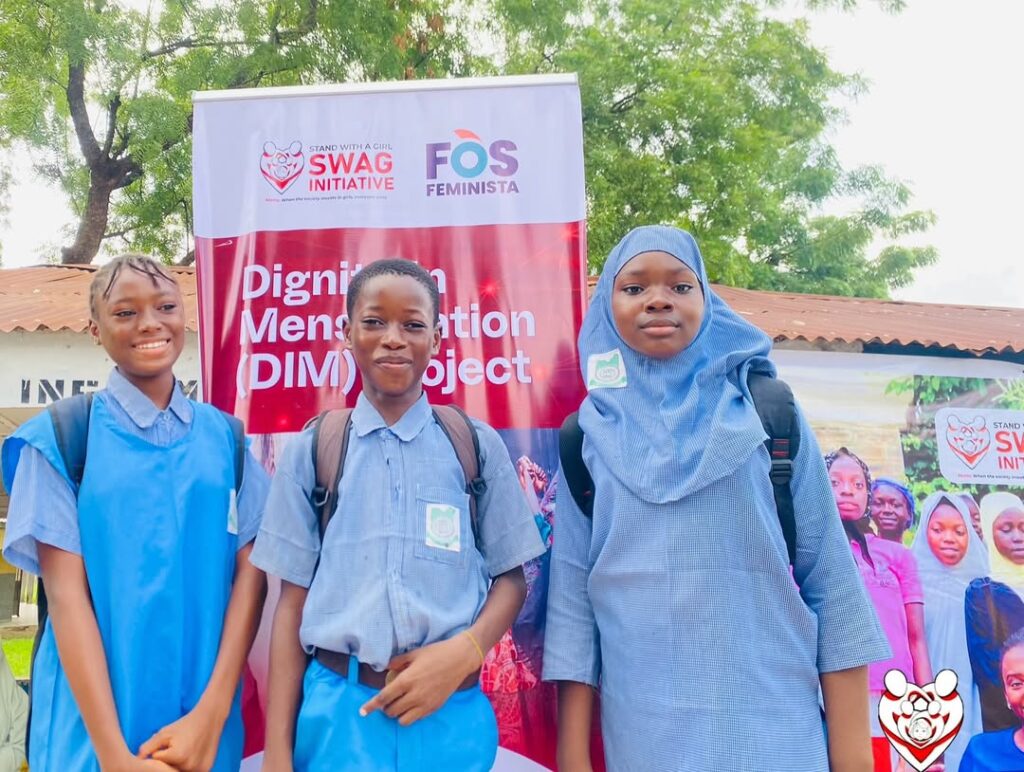
Initiative for Gender Equality and Sexual Reproductive Health (IGE-SRH) – Nigeria
In recognition of Menstrual Health Day 2025, IGE-SRH led a targeted digital campaign designed to foster awareness, challenge menstrual myths, and promote open dialogue around menstrual health. Through a combination of live discussion and creative social media content, their efforts contributed to the global movement for a #PeriodFriendlyWorld by engaging diverse audiences and amplifying critical messages.
On May 28, 2025, our organization in collaboration with the EVA’s program officer (Amaka) hosted a Twitter Space titled “Navigating Periods Beyond the Binary”, bringing together advocates, health professionals, and community members for an inclusive conversation on menstrual stigma and hygiene management. The event featured expert panelists who shared insights on menstrual health challenges, particularly focusing on marginalized groups, unpacking myths and spotlight inclusive solutions.
Complementing the live discussion, we published two impactful social media posts:
- A Myth-Busting Post that addressed common misconceptions about menstruation, aiming to dispel stigma and misinformation by presenting evidence-based facts in an accessible format.
- A Design Post featuring creative visuals that celebrated menstruation as a natural and empowering aspect of life, reinforcing positive narratives and encouraging community engagement.
- A Question and Answer video content featuring persons answering questions about their menstrual health and their experiences as well was shared to encourage community engagement.
These activities were strategically deployed on our Twitter and Instagram platforms to maximize reach and engagement. Our Menstrual Health Day 2025 activities exemplify the power of digital platforms to educate, engage, and empower communities around menstrual health. By combining expert dialogue with creative content, we contributed to dismantling stigma and advancing menstrual equity. We remain committed to sustaining this momentum and fostering inclusive conversations that promote health, dignity, and equality for all menstruators.
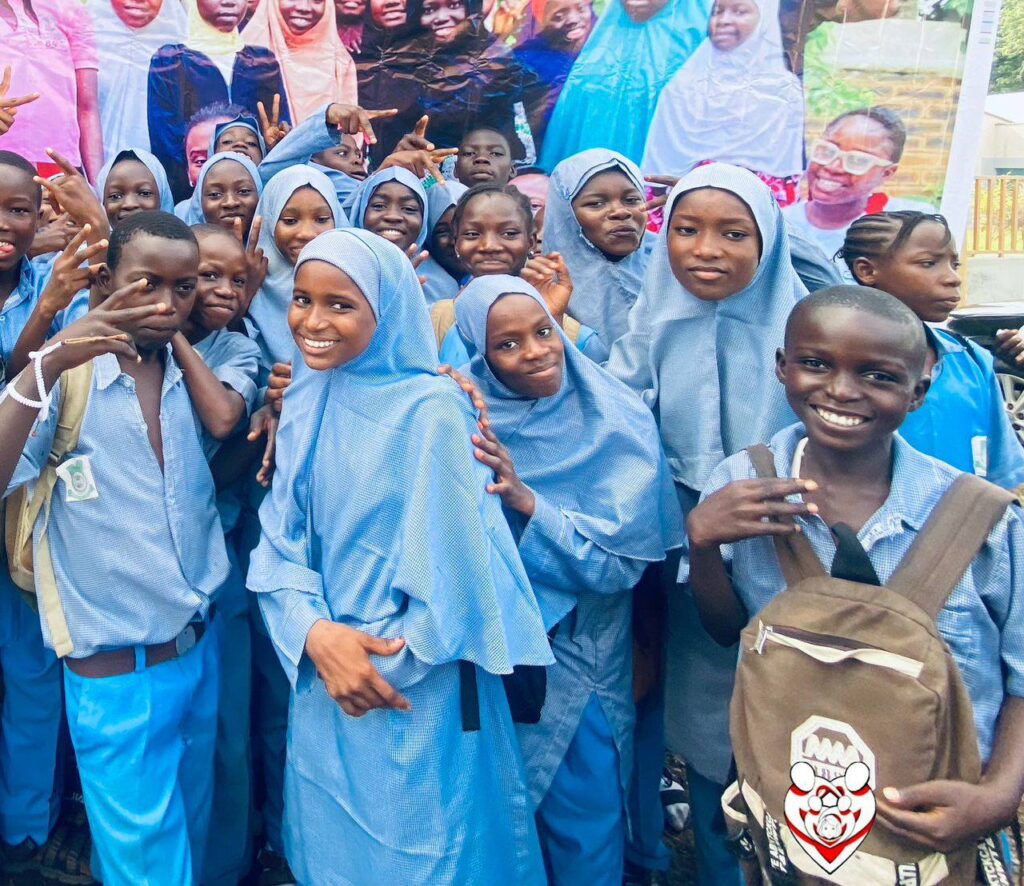
Rise to Inspire Africa Initiative (RIA) – Nigeria
In commemoration of Menstrual Hygiene Day 2025, RIA Initiative, in collaboration with the Adamawa State Ministries of Women Affairs, Health, and Education, along with SPS partners HARAF, TFT, DBK, and Bigfamily360, hosted a roundtable discussion under the theme:
“Shifting from Conversation to Policy Implementation – The Way Forward for Menstruators in Adamawa State.”
Activity Highlights:
- Two panel sessions were held on:
▪ “Towards a Menstrual-Friendly Adamawa”
▪ “From Conversations to Policy Action” - Keynote address by Rt. Hon. Mrs. Kate Raymond Mamuno, Majority Leader & Chairperson, House Committee on Women Affairs, Adamawa State House of Assembly:
“Menstruation is a blessing; therefore, it should be prioritized.”
- Representing the private sector, Mr. Gambo Joseph pledges to support free distribution of menstrual products, saying, “menstruation is not a choice while Sex is therefore Sanitary pads should be made free since condoms are free.”
- Youth voice presentation by Salma Tasiu Yusuf, inspiring a call to collective responsibility for menstrual health and dignity.
Pink Center – Pakistan
As part of the broader movement to commemorate Menstrual Hygiene Day and promote SRHR for all, Pink Center participated in the Punjab Moorat Festival — a vibrant celebration of transgender pride, culture, and resilience. The event served as a platform to raise awareness about the rights and health needs of the transgender community, including access to sexual and reproductive health services.
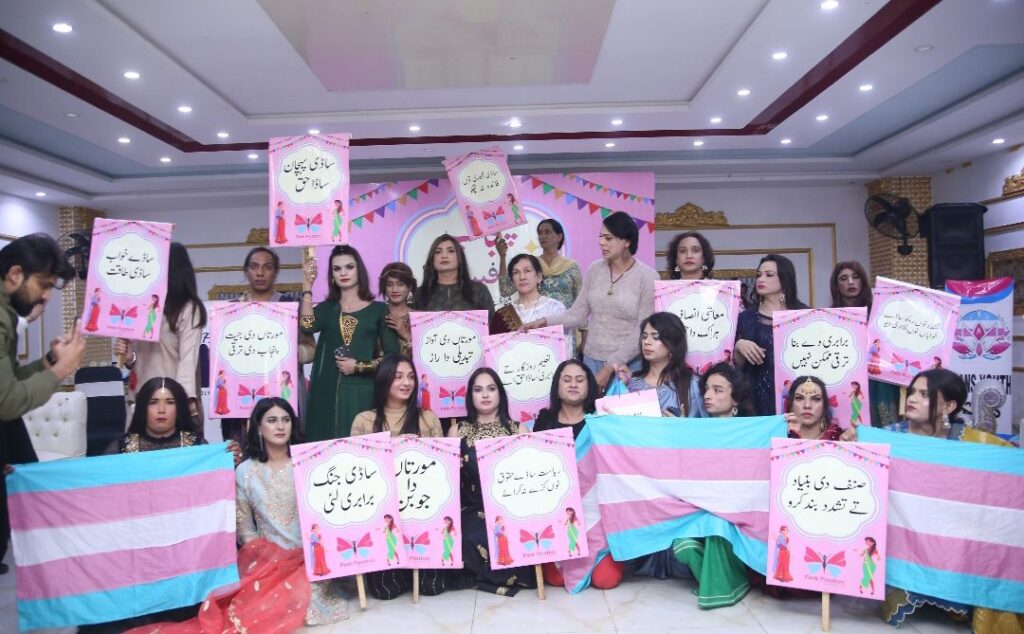
Pioneer FTM – Philippines
In observance of Menstrual Health Day 2025, Pioneer FTM released a powerful public statement and accompanying visual to affirm that menstruation is a human experience that transcends gender.
The stigma surrounding menstruation is deeply embedded in society and often amplified within trans communities, where menstrual experiences are silenced or stigmatized. When we internalize the notion that menstruation is shameful, we not only uphold harmful narratives about women but also contribute to the exclusion of our own community members who menstruate.
The post called for inclusive language, equitable access to menstrual products and care, and solidarity across communities to uphold the dignity of all menstruators.
WGNRR – Philippines
WGNRR conducted a dialogue last May 28, Red Ink for Letter and Liberation in Sine Pop Cubao, Quezon City. They focused on reshaping menstrual narratives by centering the lived experiences of menstruators—particularly those in marginalized communities. They actively foster conversations with fellow advocates, focusing on the realities of menstruation in homes, schools, workplaces, and communities. As part of the event, they had a blackout poetry where they transformed personal experiences into public resistance and advocacy for menstrual dignity. They also launched the Dignified Menstrual Health Project and welcomed new partners committed to advancing menstrual dignity for all.
The SRHR4All Festival brought together diverse groups—women’s rights organizations, youth organizations, human rights organizations, feminists, activists, community leaders—to have discussion spaces for prevailing issues on SRHR and Justice, including Menstrual Dignity. They provided a platform for participants to engage in creative workshops where they created powerful artworks that reflect our struggles, amplify our voices, and demand urgent action. The Menstrual Dignity Space became a place of:
- Open discussion spaces to talk about issues surrounding menstrual dignity
- Interactive pop quiz where they answer trivia questions and share insights related to menstruation
- Period Persona Painting where participants explore and confront societal attitudes and internalized stigma around menstruation through creative self-expression
Through the Menstrual Dignity Space, they channeled their collective struggles into tangible pieces that speak louder than words alone.
